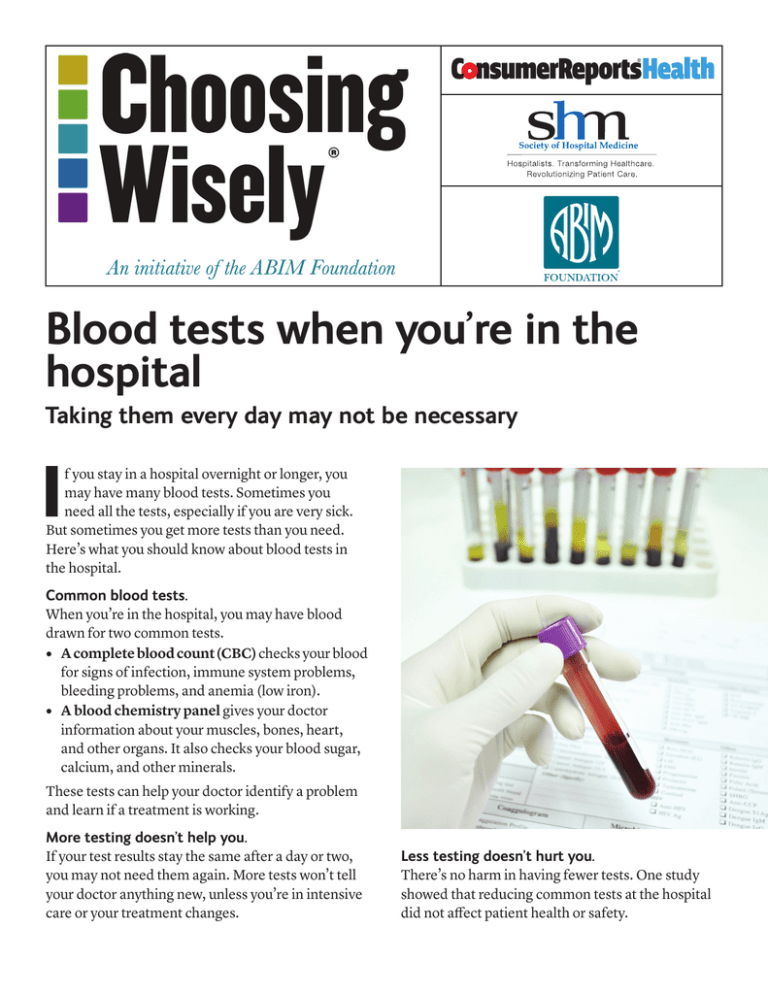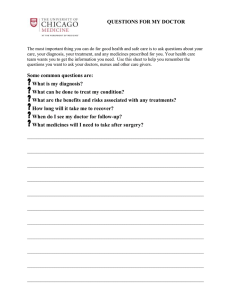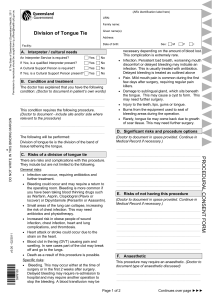Blood tests when you`re in the hospital
advertisement

® Blood tests when you’re in the hospital Taking them every day may not be necessary I f you stay in a hospital overnight or longer, you may have many blood tests. Sometimes you need all the tests, especially if you are very sick. But sometimes you get more tests than you need. Here’s what you should know about blood tests in the hospital. Common blood tests. When you’re in the hospital, you may have blood drawn for two common tests. • A complete blood count (CBC) checks your blood for signs of infection, immune system problems, bleeding problems, and anemia (low iron). • A blood chemistry panel gives your doctor information about your muscles, bones, heart, and other organs. It also checks your blood sugar, calcium, and other minerals. These tests can help your doctor identify a problem and learn if a treatment is working. More testing doesn’t help you. If your test results stay the same after a day or two, you may not need them again. More tests won’t tell your doctor anything new, unless you’re in intensive care or your treatment changes. Less testing doesn’t hurt you. There’s no harm in having fewer tests. One study showed that reducing common tests at the hospital did not affect patient health or safety. Getting too many blood tests has risks. Blood tests are very safe. But they can cause other problems if you have them every day. • Anemia. This can happen if you lose too much blood. With anemia, your blood cells can’t carry enough oxygen to the rest of your body. Anemia can make it harder for you to heal. It is especially dangerous for people with heart or lung problems. • Increased risk of infection. Blood tests have a low risk of infection. But the more tests you have, the more risk you have. • Less sleep. Nurses often wake patients up to get blood tests. Poor sleep can affect how you heal. You may need a blood test every day if: • You are in intensive care. • The doctors don’t know what’s wrong with you. • You are trying a new treatment. • Your doctor thinks you may have internal bleeding, especially if you’re having surgery. Ask your doctor why you have blood tests every day. It’s okay to ask your doctor why you need more blood tests. Ask if the test gives new information or is likely to help your treatment. If you don’t understand the reasons for the tests, you may not really need them. Ask if you can skip the extra tests. This report is for you to use when talking with your health-care provider. It is not a substitute for medical advice and treatment. Use of this report is at your own risk. © 2015 Consumer Reports. Developed in cooperation with the Society of Hospital Medicine for Choosing Wisely, a project of the ABIM Foundation. To learn more about the sources used in this report and terms and conditions of use, visit ConsumerHealthChoices.org/about-us/. 9/2015 Advice from Consumer Reports Other tests you may not need If you’re scheduled to have surgery, your doctor may want you to have certain tests. These are usually done before the day of your surgery. Consider the tests below only if you have certain problems or need some kinds of surgery: • Blood coagulation test. May be needed if you’re having brain, cancer, heart, or spinal surgery. You may also need it if you have certain medical conditions or take blood thinners. • Breathing test. Recommended if you’re having lung, chest, or upper abdominal surgery. You may also need it if you have lung disease or are short of breath. • Cardiac stress test. May be needed if you have heart disease, especially if you are having major surgery. • Chest X-ray. May be needed if you smoke, have symptoms of lung or heart disease, or are older than 70, especially if you’re having major surgery.




